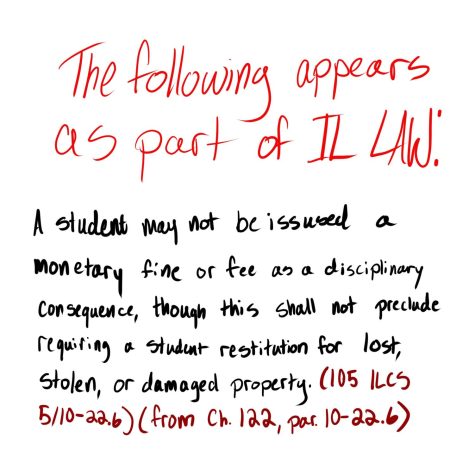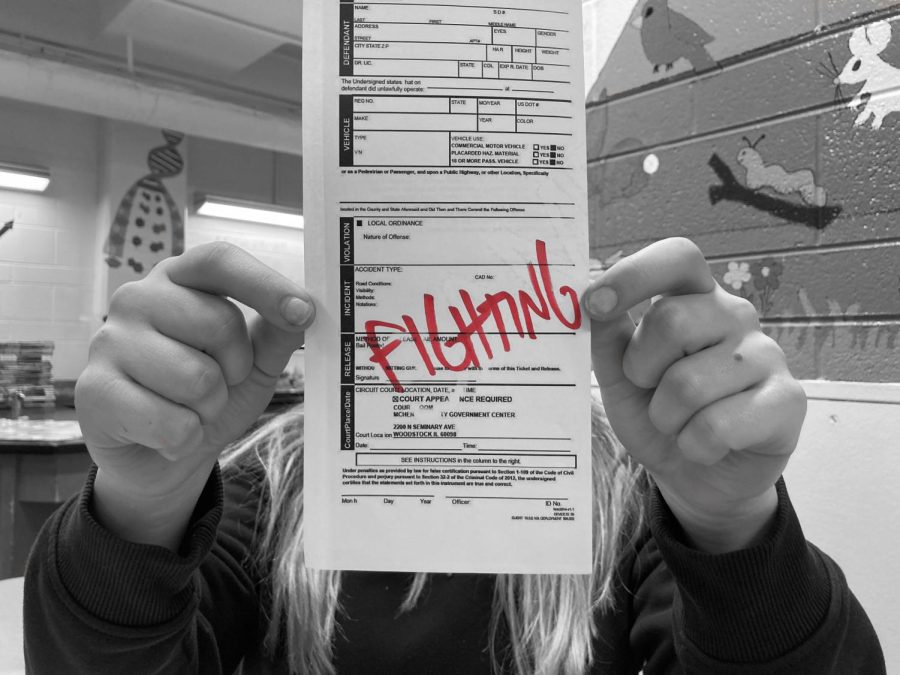The state representatives
May 19, 2023
Despite a state law that says “A student may not be issued a monetary fine or fee as a disciplinary consequence,” students at MCHS continue to receive tickets from the McHenry Police Department for their behavior in school.
Ticketing students due to misbehavior on campus resulted from loopholes in Illinois law.
The Illinois General Assembly modified Senate Bill 100 in 2015 to state that “a student may not be issued a monetary fine or fee as a disciplinary consequence.” Since the language does not specify who can or cannot issue the fine, schools have been referring students to the police.
Schools fall under police departments’ jurisdiction, which allows them to ticket students seemingly without breaking the SB100 law. District 156’s lawyer was not available to comment.

Following the ProPublica / Chicago Tribune investigation, Illinois is trying to close that loophole. Chicago Democrat Rep. La Shawn Ford filed House Bill 3412 on Feb. 17 to amend the School Code.
“This bill is to ensure any behavior violations are referred to disciplinary and not law enforcement,” Ford said. “Right now, we see that certain behaviors are being reported to police [when they] should actually be reported to schools and principals. The goal is to not send students to police when they should be getting detentions and stuff like that.”
The proposed bill clarifies that students cannot be referred to another local public entity, school resource officer, or peace officer for a fine if the behavior “can be pursued through the school district’s available disciplinary interventions and consequences.” HB3412 is ongoing work brought to Ford by agencies and organizations seeking to protect youth and families.
“When you deal with ticketing, there is no real system in place for students to have a fair due process,” Ford said. “There is no due process in school ticketing, and students have to go to court alone and deal with these issues. They have to miss school. Parents are saddled with the debt of these tickets.”
HB3412 seeks to give schools and police a direction to support youth instead of involving the criminal justice system. While police would still handle criminal activity, schools would resolve all other misbehavior and handbook violations.
“Right now, what we see is that we traumatize students by involving police in situations [that] should be dealt with by social workers and counselors,” Ford said. “We immediately throw students in the criminal justice system instead of dealing with them in our school setting. We believe it opens up the school-to-prison pipeline once you have students involved with law enforcement.”
Ford adds that some want to keep ticketing to “skirt their responsibilities” and that it’s easy for a school to say, “I’m just going to call the police on this kid.” Though some have concerns over the bill, he believes “this is what we need” to support students.
“It will not make schools more dangerous,” Ford said. “If a student is breaking a law, then the police can be called. But, let’s say a kid is having a fight in the school — some schools will call the police. Is that something we should call the police for, or is that something that the school principal can actually handle? If there are no guns involved, no weapons involved, and kids fight in the hallway — we don’t believe that is something you have to call the police for.”
On March 27, HB3412 was re-referred to the Rules Committee. It will need 60 votes to pass in the Illinois House.
“Hopefully we’ll know something soon,” Ford said. “Right now, a few Democrats have been out, so it’s been tough getting our 60 votes. I hope we pass it before May the 19th. That’s my hope.”
